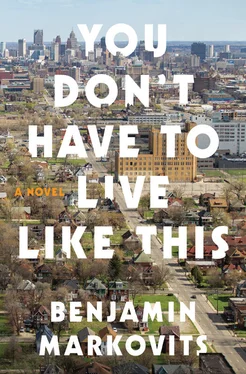She said “drawing” like “drawring.” There were pictures of women’s faces, and babies, and people watching TV, and dirty kitchen sinks. There was a picture of an old dead-looking man lying in a hospital bed. There were some cars and bicycles. I saw the odd gun, too, and a lot of posters of women or ballplayers or actors on bedroom walls. There were pictures of high school kids horsing around after school.
“What do you want them to do?”
“Well, they can do what they want, but I want them to use their imaginations. That’s why we decided to use the school printers, which you can probably tell are very low definition. So that the photographs don’t look too realistic. In class we talk about Impressionism and Pop Art and all that, but most of them don’t make the connection. Their drawings are just like the photos, only worse. But it’s only been a month; we’re still working on it. Let’s eat. Teaching makes me hungry.”
“How old are the kids?”
“This is my freshman class, but some of them are a little older.”
“Where are Alonzo’s?”
She showed them to me. “This one’s maybe more interesting than the others.” It was a photograph of one those storefront churches, a brick facade painted white, with a barn door and a big purple cross above it going into the roof. A.M.E. was hand-painted on either side of the cross. The picture he drew to go with it showed something that looked a little more like a cathedral, with a spire and peaked roofs.
“He didn’t make that one up either,” she said. “That’s the Central United Methodist Church, the one by the ballpark, where the Tigers play. A Michigan Historical Site. They had the first gay priest there, at least in Michigan. The first gay Methodist. It’s kind of a hippie church.”
At lunch, which we ate in the cafeteria, I saw a few white faces, all teachers. Two of them sat down with us, a man and a woman — Gloria seemed to be good at making friends with white people. The woman was blond and maybe forty years old, Jenny Schramm. She sounded like she was from Michigan, an accent I had started to recognize and which probably made her working class. She talked a lot. She was one of those talkative types who live their whole lives under the impression that they’re helpful and well liked. Gloria set her off by saying I wanted to become a substitute teacher. Jenny told me what you need to do.
You need to get fingerprinted. You need to pass a few basic tests, including safety checks, most of which you can take online. Then you need at least to begin some kind of certification process. There are online courses for that as well. I wrote most of this down.
“How do you like teaching here?” I asked, and she talked some more.
“Sometimes I feel like salt in a pepper pot,” she said at one point. “But I don’t mind that.” Gloria had gone for a coffee refill or maybe she wouldn’t have said it.
The man had a leather jacket on, which he didn’t take off, even at lunch, and gray stubble. His name was Eric Kaymer and he went out halfway through to smoke a cigarette. But before he went he flirted with Gloria, which I could only partly listen in on because of the woman. His accent wasn’t as rough as his appearance. From what I overheard he went to a lot of theater.
Gloria seemed a very popular person in the cafeteria. Girls called out “Miss Lambert” from across the room, and stopped by our table on their way to class. The lunch ladies liked her, too. She had a quick natural smile and I wondered if it was sometimes a burden to her, if it was just something she could do.
“Were you a sorority girl?” I asked her at one point.
“Delta Sigma Theta,” she said. “Why?”
“Do you keep in touch?”
“I keep in touch with everybody. Nobody gets away from me .”
When Eric came back, Gloria said to him, “Greg’s one of these guys living over in the new neighborhoods.”
“Oh, I thought about getting in on that.”
“But you decided not to?”
“They turned me down,” he said.
“I only got through because I know the guy who started it.”
“How’s it working out?”
“I don’t know yet. I’ve met a lot of strangers; people talk to each other. After college I went out of the country for about ten years. I only just came back. But the sense I get from the people I talk to is that they weren’t very happy with their old lives. Not just because of money worries, though that, too. I read once that when people don’t know what to do with themselves, when they reach a dead end, they dream about going back to school or becoming an actor. Those are the kind of people we get.”
“Is that what you’re doing?” Gloria asked.
“Maybe that’s why they turned you down,” I said to Eric. “We were looking for people who wanted to change their lives. You have a life here already.”
“Is that what I have? So what’s your excuse?”
“I’m one of these academic drifters. I spent my twenties trying to get a job I’m not gonna get, and now I’m not fit for anything else. But it’s been good for me so far. You know how there are some basic facts about yourself that you don’t know, because you don’t want to face them or can’t get the angle to look. I’m trying to look.”
“That sounds like a full-time job,” Eric said. “Does it pay much?” So I shut up.
After lunch Gloria walked me to the parking lot. “Did you find out what you wanted to know?” she said to me.
“Mrs. Schramm was very helpful.”
“Yeah, Jenny talks a lot. Was there anything else?” She sounded a little combative.
“What’s the graduation rate?”
“Depends how you do the accounting. If a kid doesn’t show up for class but twenty days a year, does it mean he didn’t graduate or he didn’t attend? But it’s about a quarter.”
“And can they read and write?”
“Not as well as I’d like. Anything else? Well, I got things to do,” she said, and I felt really pretty unhappy and ashamed when she left.
This is what I thought about on the way home.
One night at Yale, I walked into my college dining hall while some sorority party was going on. It was a Friday night, a little after ten o’clock, and I heard the noise of the party after coming back from the library. A dull thudding bass line and other sounds, crowd sounds and sometimes clapping. You could hear it from the courtyard, and since there was nobody at the door, checking tickets, I went in. Everybody inside was black, and they were almost all women, which I could see even though most of the lights were off — except for a disco ball or a spotlight, I can’t remember which, maybe both, which shone or glittered in the center of the room. Underneath the ball or in the light two black men were dancing and taking their clothes off. When I got there they were shirtless and down to their jeans. After a few minutes they raised their arms and pointed at the women in the crowd, and a couple of volunteers eventually walked into the spotlight, or had to be pushed. The men picked them up and kept dancing — picked them up over their heads, I mean, and gently lowered them again, in time to the music, closer and closer to their faces, while everyone cheered them on. Even though there were maybe two hundred people in the room, which was hot with crowded bodies, I had the sense that something private was going on, and it was only after I walked out again, into the cooler evening, that I realized how that could be. What I had seen was somehow racially private, and even though nobody stopped me or asked me what I was doing there, I felt like I had passed through closed doors into a kind of family room where things could be said and done without embarrassment, which wouldn’t be shown or discussed outside.
Читать дальше












